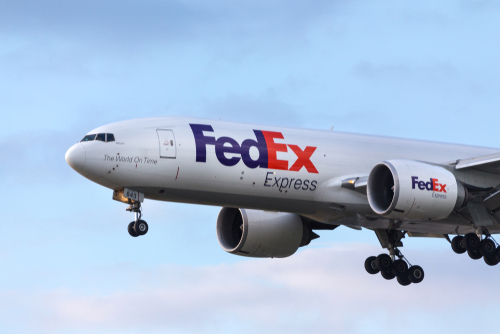
Top executives of FedEx and UPS assured Congress Thursday their firms have been preparing for months and are ready to transport hundreds of millions of doses of the fledgling COVID-19 vaccines, the first of which is expected to be approved by federal regulators as soon as Thursday.
“We’ve taken the necessary steps and are well positioned to respond both here and abroad,” Richard Smith, regional president of the Americas and executive vice president of FedEx Express, told members of the Senate Commerce, Science, and Transportation Subcommittee on Transportation and Safety during Thursday’s hearing on the logistics of transporting the COVID-19 vaccine.
But a key state health regulator told the panel that state health agencies are sorely lacking in capabilities to educate the public on the new vaccines and on their effectiveness and to dispel myths and vaccine hesitancy and the states have asked Congress for $8.4 billion in supplemental funding to help the cause. “States have had little to no input into the strategies to do this,” said Dr. Rachel Levine, Secretary of Health for Pennsylvania and president of the Association of States and Territorial Health Officers.
Levine, whose organization represents health agencies in all 50 states, said the only way to end the pandemic is through widespread vaccination which will necessitate a broad education and communication program to reach those individuals who do not believe in vaccinations or who have been led to believe the new vaccine may be dangerous. This kind of nationwide education will provide major challenges in funding over both the short term and long haul, she told the panel.
The hearing comes as the Food and Drug Administration was expected to approve the first of several COVID-19 vaccines, produced by Pfizer and BioNTech, as soon as Thursday afternoon, with another vaccine developed by Moderna expected in the coming weeks. It also comes as Congress continues to debate a COVID-19 relief package that would provide funding for various state programs to distribute the vaccines and to educate the American public.
The transportation companies and the states will have the main role in distributing an estimated 600 million doses of the various vaccines over the coming months under the federal government’s Operation Warp Speed. The distribution will pose “one of the biggest logistics challenges in ongoing history,” U.S. Sen. Deb. Fischer (R-NE), chair of the Senate subcommittee panel, said during the hearing.
Levine, noting the states will have the main role in distributing the vaccine, said a major outreach will be required, especially to those who are dubious about a vaccine and its possible side effects. The states will also be responsible for tracking the required double dosing of Pfizer’s vaccine.
She said Pennsylvania has $6 million to fund outreach for December and January but will need much more over the long term. “This is a long mission,” said Levine. “And it’s going to take much more money for education and communication.”
“One thing this pandemic has reaffirmed is the need for investment in public health,” said Levine.
U.S. Sen. Amy Klobuchar (D-MN) agreed with Levine, saying, “we’ve got to make sure the resources are there for our states and locals.”
Smith and a top executive of UPS, Wesley Wheeler, president of Global Healthcare at the company, explained to the senators how each company has ramped up to transport the hundreds of millions of vaccine doses to every corner of America.
Wheeler explained his company has already tested much of its distribution plans over the past six to eight months while it delivered tens of millions of logistic and protective supplies to healthcare workers and the public. During the pandemic. The company has recently constructed a dry ice manufacturing plant at its Louisville, Ky., facility that can produce up to 24,000 pounds of dry ice a day that will be needed to maintain the Pfizer vaccine. It has also worked with Pfizer and McKesson Corp., to ensure the viability of the two companies’ cold transportation kit for the vaccine, which will keep the vaccine cold enough (-70 Celsius, -94 Fahrenheit) for three days in order to retain its effectiveness.
Each vaccine package will have the highest priority for UPS, insisted Wheeler. “It goes on the plane first and comes off the plane first,” he stated.
UPS, which usually expands its workforce during the holidays, has added 100,000 temporary employees this season to handle the holiday rush and the added surge of vaccine transportation, Wheeler stated.
Each vaccine package, he explained, will be equipped with both GPS and RFID tracking devices both inside and on the outside so that manufacturers and distributors will be able to track closely the location of each dose 24 hours a day. “We’re all watching the packages all day long,” he noted.
Wheeler also said it is good that UPS and the Operation Warp Speed are partnering with CVS and Walgreens on the distribution because UPS has longstanding relationships with both pharmacy chains.
FedEx, which is already capable of “delivering to every Zip Code in the United States,” according to Smith, has added 70,000 temporary workers this season as it prepares for vaccine delivery. He assured the panel the company’s vaccine transport strategy has been tested in previous vaccine distributions, including the movement of 80 million vaccine doses for the H1N1 virus a few years ago. “We are well positioned to respond both here and abroad,” Smith said.
U.S. Sen. Gary Peters (D-MI) asked the executives about the possibility of the chain of transport being disrupted by cyberattacks. Wheeler said they have been working with Pfizer and McKesson transporting important medical supplies for years so they have a well-established data security network with the companies.
U.S. Sen. Richard Blumenthal (D-CT) asked the transportation executives whether there are any impediments to delivering the necessary doses to veterans’ hospitals. Smith answered no. “I’m not aware of any logistics challenges that would prevent us from delivering to veterans’ facilities.”




